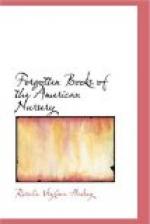The title of “Food for the Mind” is of special importance, since in it Gaine made a clever alteration by inserting the words “Good Boys and Girls in America.” The colonials were already beginning to feel a pride in the fact of belonging to the new country, America, and therefore Gaine shrewdly changed the English title to one more likely to induce people to purchase.
Gaine and Rivington alone have left records of printing children’s story-books in the town of New York before the Revolution; but before they began to print, other booksellers advertised their invoices of books. In 1759 Garrat Noel, a Dutchman, had announced that he had “the very prettiest gilt Books for little Masters and Misses that ever were invented, full of wit and wisdom, at the surprising low Price of only one Shilling each finely bound and adorned with a number of curious Cuts.” By 1762 Noel had increased his stock and placed a somewhat larger advertisement in the “Mercury” of December 27. The late arrival of his goods may have been responsible for the bargains he offered at this holiday sale.
GARRAT NOEL Begs Leave to Inform the Public, that according to his Annual Custom, he has provided a very large Assortment of Books for Entertainment and Improvement of Youth, in Reading, Writing, Cyphering, and Drawing, as Proper Presents at CHRISTMAS_ and New-Year._
The following Small,
but improving Histories, are sold at Two
Shillings, each,
neatly bound in red, and adorn’d with Cuts.
[Symbol: hand]Those
who buy Six, shall have a Seventh Gratis,
and buying only Three,
they shall have a present of a fine large
Copper-Plate Christmas
Piece: [List of histories follows.]
The following neat Gilt
Books, very instructive and Amusing being
full of Pictures, are
sold at Eighteen Pence each.
Fables
in Verse and Prose, with the Conversation of Birds
&
Beasts
at their several meetings, Routs and Assemblies for
the
Improvement
of Old and Young, etc.
To-day none of these gay little volumes sold in New York are to be seen. The inherent faculty of children for losing and destroying books, coupled with the perishable nature of these toy volumes, has rendered the children’s treasures of seventeen hundred and sixty-two a great rarity. The Historical Society of Pennsylvania is the fortunate possessor of one much prized story-book printed in that year; but though it is at present in the Quaker City, a printer of Boston was responsible for its production.
In Isaiah Thomas’s recollections of the early Boston printers, he described Zechariah Fowle, with whom he served his apprenticeship, and Samuel Draper, Fowle’s partner. These men, about seventeen hundred and fifty-seven, took a house in Marlborough Street. Here, according to Thomas, “they printed and opened a shop. They kept a great supply of ballads, and small pamphlets for book pedlars, of whom there were many at that time. Fowle was bred to the business, but he was an indifferent hand at the press, and much worse at the case.”




